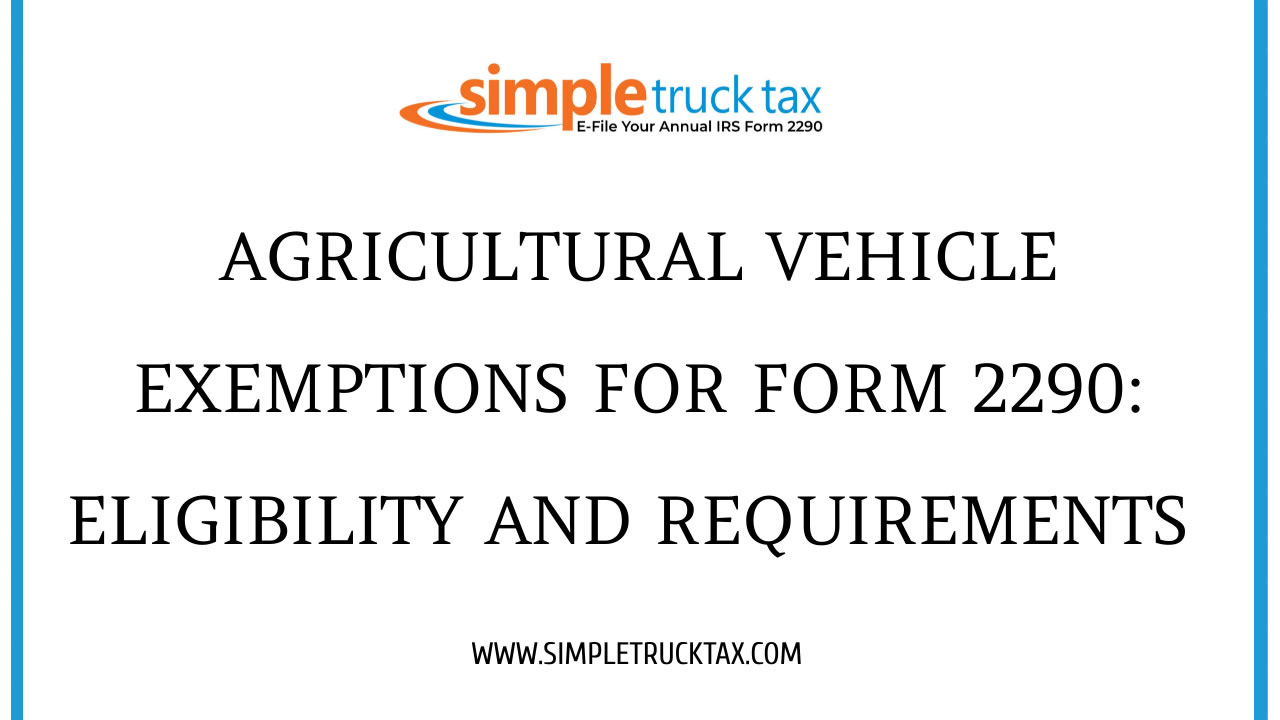
Agricultural Vehicle Exemptions for Form 2290: Eligibility and Requirements
If you're a farmer or agricultural business owner and operate vehicles primarily used for farming purposes, you may be eligible for certain exemptions on your Form 2290 filing for Heavy Vehicle Use Taxes (HVUT).
The IRS provides exemptions for certain agricultural vehicles under certain conditions, allowing qualifying farmers to save money on taxes while still getting the job done.
Here's what you need to know about agricultural vehicle exemptions for Form 2290:
Eligibility for Agricultural Vehicle Exemptions
To be eligible for an agricultural vehicle tax exemption, your vehicle must meet the following criteria:
- Designed for agricultural use: Your vehicle must be specifically designed for agricultural use, such as tractors, combines, and harvesters.
- Registered as an agricultural vehicle: Your vehicle must be registered as an agricultural vehicle with your state's department of motor vehicles.
- Used primarily for farming purposes: Your vehicle must be used primarily for farming purposes, which means at least 50% of its mileage must be for agricultural purposes. This includes transporting agricultural products, equipment, or supplies to or from a farm, or between farms.
Requirements for Agricultural Vehicle Exemptions
If you meet the above criteria, you'll need to provide the following information to claim an agricultural vehicle exemption on your Form 2290:
- IRS Form 2290: When filing your Form 2290, you'll need to indicate that your vehicle is exempt from the Heavy Vehicle Use Tax (HVUT) due to agricultural use.
- Vehicle identification number (VIN): You'll need to provide the VIN for each of your eligible agricultural vehicles.
- Proof of registration: You'll need to provide proof of registration for each of your eligible agricultural vehicles.
- Proof of agricultural use: You'll need to provide documentation showing that your vehicle is primarily used for farming purposes, such as mileage logs or purchase records for agricultural products.
- Schedule 6: You'll need to complete Schedule 6 of the Form 2290, which is used to claim the agricultural vehicle exemption and calculate any prorated taxes.
Benefits of Agricultural Vehicle Exemptions
By claiming an agricultural vehicle exemption, you could enjoy the following benefits:
- Lower tax bill: You'll pay less in HVUT taxes, which can save you hundreds or even thousands of dollars depending on the size of your fleet.
- Reduced paperwork: Filing for an agricultural vehicle exemption can simplify the Form 2290 filing process, as you'll only need to report eligible vehicles instead of your entire fleet.
- Increased profitability: By reducing your tax bill, you can improve your bottom line and reinvest those savings into your business.
Conclusion
If you're an agricultural business owner, take advantage of the IRS's agricultural vehicle exemptions to save money on your Form 2290 taxes. By meeting the eligibility requirements and providing the necessary documentation, you can claim an exemption for eligible vehicles and reduce your tax burden. Consult with a tax professional or advisor to ensure that you're following all the guidelines and regulations to fully benefit from these exemptions.